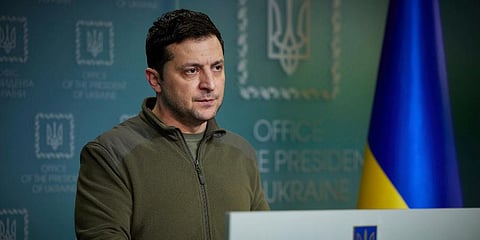

PROVIDENCE: Russian state media is spreading misinformation about the location of Ukrainian President Volodymyr Zelenskyy in what analysts said is an attempt to discourage resistance fighters and erode support for Ukraine around the globe.
A story published by the Russian News Agency Tass this week quoted a Russian lawmaker saying Zelenskyy “hastily fled” Kyiv for Lviv in far western Ukraine, despite photos and video clips showing him leading Ukraine's defense from its capital.
It's one of many distorted claims to emerge from a Russian propaganda and disinformation campaign that aims to strengthen domestic support for the invasion and undermine the resolve of Ukrainians. But the same tactics that have sustained such propaganda for years are running into a far more complex reality where the claims can be instantly and credibly rebutted on social media.
Videos and photos of Zelenskyy in Kyiv have quickly become some of the defining images of the invasion, rallying support for Ukraine at home and abroad and challenging Russia's attempt to control public perception.
By claiming he's fled Kyiv, Russia hopes to undermine Zelenskyy's status as a Ukrainian hero while also suggesting legitimate sources of news and information can't be trusted, according to Sarah Oates, a professor at the University of Maryland who studies Russian propaganda.
To Oates, it's a move that smacks of desperation by a Russian propaganda machine that can't compete with viral images of Ukrainian defiance.
“They're flailing. They've been doing this for decades and they have a very well oiled delivery system but right now their content just isn't working,” Oates said. “The Ukrainians may be completely outgunned by traditional military, but they are winning the propaganda war.”
Some of the most popular posts falsely claiming Zelenskyy has fled are clearly aimed at an international audience. The news outlet Sputnik ran translated versions of the story not only in English and Spanish but also in Portuguese and Vietnamese. A Spanish-language TikTok video created by Sputnik — set to the grooves of the American band Twenty One Pilots — has racked up more than 2.3 million views.
Zelenskyy has declined American offers to help him evacuate the city.
“The fight is here; I need ammunition, not a ride,” Zelenskyy said last week, according to a senior American intelligence official with direct knowledge of the conversation.
Despite the evidence that Zelenskyy remains in Kyiv, Sputnik and Tass have not removed their claims or added corrections. The story has also been republished in Italy, India and China.
The false story began spreading on Twitter on Friday when George Papadopoulous, a former aide to ex-President Donald Trump, posted a link to the claim in an Italian publication. Papadopoulos served prison time for lying to the FBI during its investigation into Russia's meddling on behalf of Trump in the 2016 election.
“Breaking: Zelensky, after saying he would not abandon Ukraine, has fled the country,” Papadopoulous tweeted. He did not immediately return a message seeking comment on Friday.
Claims that Zelenskyy has abandoned the capital aren't the only narratives Russia is trying to use to lower Ukrainian morale, according to Roman Osadchuk, a Ukraine-based analyst with the Atlantic Council's Digital Forensic Research Lab. He said Russian forces have also tried to spread claims that Ukraine has surrendered.
Early in the invasion, a fake account said to be controlled by Zelenskyy appeared on the platform Telegram telling Ukrainians to surrender to the invaders.
“Attacking morale seems to be really important for the Russian forces,” Osadchuk said Friday during an online discussion about the conflict.
After the European Union’s president called for a ban on Russian state media, a wave of tech companies blocked the channels from their platforms within the EU. They include Meta, which owns Facebook and Instagram, as well as TikTok and Google, the owner of YouTube.
TikTok, which boasts more than one billion users worldwide, has emerged as perhaps the leading front in the information war that's running parallel to the military invasion, according to Ciaran O'Connor, an analyst who researches online disinformation at the London-based Institute for Strategic Dialogue. TikTok's loose content moderation policies when compared to Facebook or YouTube make it a more effective means of spreading misinformation and propaganda.
One favored tactic used by Russian state media is to highlight pro-Russian comments from Western leaders to divide its opponents, O'Connor said. For example, the Russian news agency RIA Novosti uploaded a TikTok video clip this week featuring Trump's recent praise of Russian President Vladimir Putin. It has been viewed more than 4 million times.
“This is one of the first major wars in which TikTok has been at the forefront of events on the ground,” O'Connor said, “both for people watching from afar but also those trying to document events, disseminate narratives and shape perceptions.”